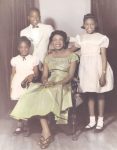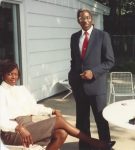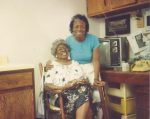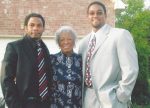By Ashley Benkarski
ANTIOCH, TN — Local resident Pauline Marable Hall has many life achievements, and she’s just gained another by celebrating her 100th birthday last year on Oct. 15.
She’s called Nashville home for eight decades and has served in various leadership and service positions throughout her life, especially in the faith and health realms, taking on roles in supervisory positions and as Assistant, Interim and Acting Director of Nursing and education programs at Hubbard Hospital and Tennessee State University. She was an instructor in Psychology and Nursing education at TSU in the 1960s and 1970s and has also served as the college’s chairperson of the Accreditation and Curriculum and Evaluation Committees in Nursing Education. Her professional/service memberships include Charter Member of the Tennessee Society of Nursing Services Directors, Zeta Phi Beta Sorority, Inc., and Chi Eta Phi Sorority, Inc.
She was integral in the reinstitution of the Episcopal Church Order of the Daughters of the King in 1998 at St. Mark’s Episcopal Church in Antioch, serving as a mentor and study leader to the chapter’s four new members when it was received into the National Order. She performed as the chapter’s President and Treasurer for many years, organized the Bishop’s visits to St. Mark’s and was a chaplain for the Nashville Chapter of Episcopal Church Women. “I instituted that same chapter in Hampton, Va., when we lived there, and it’s still active,” beamed Hall.
Though Hall has started attending a different church, the ladies of the DOK recently celebrated her 100th birthday with a luncheon. “St. Mark’s has never let me go. They’ve always held on to me,” Hall said, smiling.
She moved to Nashville after graduating high school in 1937 from Newburyport, Mass., to attend Meharry Medical College where she earned her degree in nursing in 1942, becoming certified in anesthesia. She also became President of the college’s Pre-Alumni Association.
Continuing her education, she earned her bachelor’s and master’s degrees from TSU and an M.S.N. degree in Psychiatric Health from Vanderbilt University, where she was a doctoral candidate in Higher Education and Administration.
An ardent advocate of healthy living, Hall initiated, coordinated and instructed a class titled “Staying Healthy After Fifty” with the AARP and American Red Cross and practiced chair yoga at the local YMCA until recently. A brush with cancer encouraged her to volunteer with American Cancer Society’s “Reach for Recovery” program, where she gave support to others experiencing the disease as a survivor.
In 1943, she married the late Dr. W. F. Bernell James, a noted surgeon, and Professor and Chairman of the Department of Obstetrics and Gynecology at Meharry for over 20 years. Pauline became the Ob-Gyn Head Nurse, Director of Nursing Service and Assistant Director of Patient Care Education. They had three children together; Bernell Jr., now-deceased; Paula, a noted jazz vocalist and former Metro Nashville Public Schools instructor, and Norma, a retired U.S. Army Colonel.
After the passing of Dr. James, Pauline married her second husband, Reverend James Hall, in 1987. Rev. Hall served as rector of St. Cyprian’s Episcopal Church in Hampton, at St. Michael and All Angels, Tallahassee, Fla., and Holy Trinity Episcopal Church in Nashville. He was a community leader and also served as an instructor at Vanderbilt University. Married for 24 years, Rev. Hall passed away Feb. 2016.
Paula is part of Gordon Memorial United Methodist Church’s choir, where her mother has recently begun attending and is their oldest member. “I was a Baptist before I became an Episcopalian because I was baptized in a Baptist church in Newburyport. I remember the street it was on even now,” she smiled. “I was the only person of color who was baptized, immersed at that church.”
Asked about her childhood, Hall laughed. “You think I remember way back then? 100 years?” Raised by her grandparents who were originally from Columbia, Tenn., Hall said her childhood was like most others–playing outside with neighborhood friends until the sun went down, sometimes going skating at the local mall or visiting Salisbury Beach on the Atlantic. She grew up at 22 Liberty Street, which for many years afterwards became a favorite visitation spot for her family.
Hall was one of two black students at her high school, but race wasn’t a source of much contention for her because she had a tight-knit group of diverse friends. “It was alright because we had each other,” she remembered. “Of course, it was more noticeable when we got to be teenagers and they had dances and that sort of thing.”
The move to Tennessee, however, would be a different experience as racial tensions flared during the 1940s and ’50s. Prior to moving, Hall’s grandmother advised her to ride in the back when taking a bus. “There was a lot of conflict here in Nashville. I would take the children downtown and if they had to go to the bathroom, there was always a problem. even things like drinking water at the water fountain or eating at certain restaurants was a,challenge.” One of the few places we could go to – and enjoyed – was a very nice restaurant and club called Deborah’s near TSU,” Hall reminisced. Not one to stand down when it came to family, she would rebuff the racist policies enacted at many Nashville establishments. “Our concern was raising our children. Bernell Senior and I did our best to instill courage and compassion in them and teach them not to give in to the injustices going on around us. Unfortunately, those injustices are still prevalent today.” she lamented.
“I can add to that, if I may,” Paula interjected. “It was strenuous psychologically as well because all we ever heard was how bad being black was, how negative being black was. And anytime you saw any program on TV, the good guys wore white, and the bad guys wore black,” she said. As children they didn’t have many places to go due to segregation, but the adults in the community banded together to provide some semblance of childhood reverie. “If we wanted to go to a movie theater, we had to go down an alley and there were certain movie theaters, only one or two, that we could go to. And so, because of that our dad just had movies that he showed at home. So we were not able to do a lot of those fun things.” Despite these barriers, the parents of the neighborhood children would organize get-togethers and activities at each other’s homes to provide a safe environment. “The children today don’t even realize how fortunate they are.”
“I remember when the Klan rode down 16th Avenue South on their horses,” Paula continued. “That was scary. They were very active. And when I went to college … there was still a lot of social unrest, but the mothers came together,” she said. “I mean, if you went to church together, everybody just knew everybody. Teachers knew the students, parents. Everyone looked out for everyone else’s child.”
Asked her thoughts on racial tensions again bubbling to the surface, Hall seemed dismayed. “It seems like we’re going backwards now,” she remarked. “I’ve never seen so much controversy going on. People are so unhappy and so worried about their childrens’ futures.”
“History’s repeating itself,” added Paula. “What’s happening now in politics is the same thing that was happening back then.”
Through it all, Hall’s dedication to faith and family has kept her going. Speaking with her, it’s evident she hasn’t lost a bit of her spark. While talking about her favorite desserts (which includes Oreo cookies), Hall got a twinkle in her eye. “Deep apple pies and blueberry cobbler – you just have to scoop it out with all that nice juice,” she winked, laughing.
“Life is out there for you to enjoy. You just have to enjoy it and show gratitude to the people whom you love,” she advised.





























